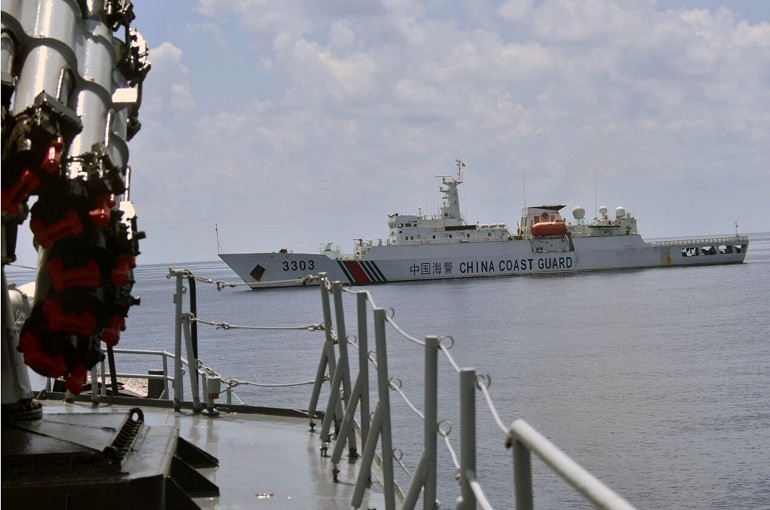Popular Reads
Top Results
Can't find what you're looking for?
View all search resultsPopular Reads
Top Results
Can't find what you're looking for?
View all search resultsNGO coalition calls for sustainable fisheries policies
A new coalition aims to push for fisheries governance that prioritizes national sovereignty and justice in fisheries and marine resources management, and upholds scientific-based recommendations, information disclosure and public participation, according to its statement.
Change text size
Gift Premium Articles
to Anyone
S
everal nongovernmental organizations are joining forces to monitor the government's policies on the fisheries sector and to make sure they would not harm the security and ecological sustainability of fish stocks and of the livelihoods of traditional fishermen.
To strengthen their bargaining power, the organizations set up the NGO Coalition for Fisheries and Maritime Sustainability (Koral).
The new coalition aims to push for fisheries governance that prioritizes national sovereignty and justice in fisheries and marine resources management, and upholds scientific-based recommendations, information disclosure and public participation, according to its statement.
“The fisheries governance should also promote institutional effectiveness that supports the strengthening of independent management, people's welfare and the preservation of coastal and marine ecosystems,” the coalition said.
The coalition comprises the Indonesian Forum for the Environment (Walhi), the People's Coalition for Fisheries Justice (Kiara), Greenpeace Indonesia, the Indonesia Ocean Justice Initiative (IOJI), the EcoNusa Foundation, Pandu Laut Nusantara, Destructive Fishing Watch, Yayasan Terangi and the Indonesian Center for Environmental Law (ICEL).
Among its programs, Koral would conduct studies and discussions, as well as provide policy recommendations to the government regarding issues in the fisheries sector to achieve sustainable and equitable maritime and fisheries governance.
“We set up a coalition so that at least President Joko Widodo and [Maritime Affairs and Fisheries Minister] Edhy Prabowo will listen to us,” EcoNusa ocean program manager Wiro Wirandi said during a press conference on Tuesday.
In addition, IOJI's enforcement support and stakeholder partnerships director, Fadilla Octaviani, highlighted the illegal fishing by foreign ships that still occurs in the country’s territory, citing the Chinese and Vietnamese fishing vessels that recently entered the North Natuna Sea.
“This is a serious threat to our sovereign rights in our exclusive economic zone and our fish resources,” Fadilla said, adding that the government should strengthen law enforcement in the nation's waters.
The standoffs in the Natuna Sea have prompted the government to increase its presence in the area by assigning the Maritime Security Agency (Bakamla) to lead fisheries and security efforts with fishing associations.
Fadilla also reminded the government to streamline its law enforcement authority over the seas because many agencies, aside from Bakamla, also patrol the oceans, namely the Transportation Ministry’s Coast and Sea Guard (KPLP), the Maritime Affairs and Fisheries Ministry’s sea patrol division, the Customs and Excise Agency and the National Police’s Water and Air Police, as well as many provincial administrations that conduct their own coast guard patrols. This often causes confusion because of overlapping operations.
She also noted that the recent omnibus bill on job creation formulated by the government eliminated the National Commission of Fish Resources Assessment and she said she feared that fisheries management would no longer be based on the best scientific evidence and fish stock availability.
The coalition raised concern over the ecological sustainability of the oceans, citing the government’s plan to export lobster seeds even though lobsters have been overexploited in all of the country’s fishing areas.
Wiro noted the government’s plan to revise fisheries regulations and once again allow cantrang (seine nets) to be used, after having been banned by the previous maritime affairs and fisheries minister, Susi Pudjiastuti.
Despite experts warning that the cantrang were harmful to coral reefs and seabed ecosystems, Coordinating Maritime Affairs and Investment Minister Luhut Pandjaitan said in January that his office and the Maritime Affairs and Fisheries Ministry was conducting a study to address the concerns.
Moreover, Destructive Fishing Watch national coordinator Moh. Abdi Suhufan highlighted the dire condition of the coral reefs in Indonesia as Indonesian Institute of Sciences (LIPI) research showed that 36.18 percent of them, 386 of a total of 1067 coral reefs, were in bad condition.
Additionally, the group urged the government to protect the livelihoods of small and traditional fishermen.
Walhi campaign coordinator Edo Rahman said the government should ensure that extractive industries would not threaten the livelihoods of people living in coastal areas and on small islands. “We always push the government to ban extractive industries in the zero- to 4-nautical-mile radius, so that it would be allocated for traditional fishermen,” he said.
Furthermore, Kiara secretary general Susan Herawati criticized the omnibus bill on job creation that would require small fishermen to have permits and allow foreign vessels to fish in Indonesia’s exclusive economic zone. She added that port developments stipulated by the bill would only benefit large fishing vessels and leave the small ones behind.
“Traditional fishermen represent Indonesia’s identity as a maritime country. If they cease to exist, the Maritime Affairs and Fisheries Ministry might as well change our identity to ‘maritime country for foreign vessels’,” Susan said. (mfp)










